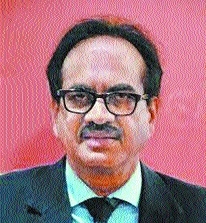‘Vaccination mgmt to play key role in COVID 3rd wave’
| Date :16-Jul-2021 |

By Vikas Vaidya :
Vaccination hesitancy can prove dangerous, says Dr Khaparde
The possibility of third wave of the coronavirus pandemic in the country is being expressed. The Government is taking all steps so that hardships citizens faced during the second wave could be avoided. According to Dr Sunil Khaparde, who has worked as Senior Advisor, Public health specialist at Mumbai, Ministry of Health and Family Welfare, Government of India, vaccination management needs proper planning. Dr Khaparde, who has also worked as Director, Family Welfare Training Research Institute (now NIPHTR), Khetwadi, Mumbai, belongs to public health specialist cadre of MOHFW having experience of about 40 years in the medical field.
He superannuated from the Central Health Services recently. Commenting on the process and pace of vaccination, Dr Khaparde said, “In the beginning, we worked faster and more people were brought into the fold of vaccination. But suddenly the process became slow. Now, people, especially in urban area, are queuing up at vaccination centres and on most occasions have to return without getting vaccinated. This situation is not good. Vaccination involves supply and demand both. The vaccination hesitancy is another dangerous aspect. Most people in rural areas and even in urban do not go for vaccination as they don’t believe it to be useful. I think this needs to be paid proper attention. If people are not going for vaccination then the awareness drive should be conducted in an effective manner. During second wave of the pandemic, hospitals were flooded by patients. If mass vaccination is done then I think such a situation be avoided.” Dr Khaparde has headed the task force appointed by Government of Maharashtra that prevented the virus from spreading in big slums like Dharavi in Mumbai. When coronavirus pandemic hit the nation, fear was expressed that the casualties would be more if the virus spreads in densely populated slums. But Dr Khaparde had suggested certain wise steps and Dharavi slums was saved from community spread of the virus.
The Dharavi model in Mumbai was appreciated by WHO, internationally as well as nationally. Dr Khaparde said, “There is lot of research done on the vaccination aspect. Lot of discussion also held on, Which vaccine is better? But in my view, there is no bad or good vaccine. One must take vaccine whichever is available. Secondly, from Government view there is no gap between the supply of vaccination. Many times availability of vaccine creates problem. This should not happen. Vaccination should be treated as continuous process.” Now, discussion about new strain, Delta Plus variant, is on. Dr Khaparde is not in favour of getting panicky. At the same time he feels citizens must take precautionary steps. There is one rule by Government where it had said that if positivity rate of coronavirus is below 5% and the preparedness is 95% then there is no need for lockdown.
Why now Government imposing lockdown? According to Dr Khaparde, the answer lies in people’s behaviour. “I agree with that circular and lockdown should not be imposed. But people’s behaviour, especially the COVID-related one, is the cause of worry. If everybody starts wearing mask, use sanitizers, follow physical distancing rules, the picture will be different,” pointed out Dr Suil Khaparde. Dr Khaparde has discharged his duties as Deputy Director General (NACO), Director National Blood Transfusion Council and and Deputy Director General, TB. His tenure of DDG, TB was very exciting and challenging where he developed the strategy to eliminate TB by 2025. In July 2018 he has been posted as Advisor Public Health at DGHS. New Delhi. (Higher administrative. Grade) l. After that he was been posted as Advisor public health at PHO Mumbai. During Covid-19 period Dr Khaparde led three Central Teams for COVID 19 for Maharashtra. My tenure I worked at National level closely with WHO , UNICIF. CDC USAIDS and UN organisation in various important public health programme.